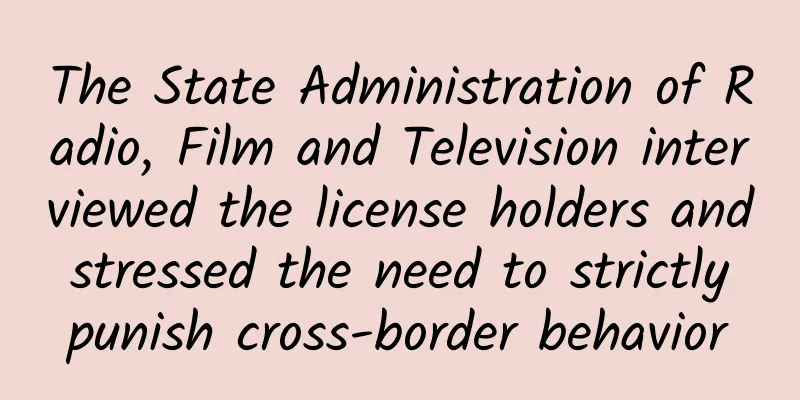The State Administration of Radio, Film and Television interviewed the license holders and stressed the need to strictly punish cross-border behavior

|
According to sources, the State Administration of Radio, Film and Television recently summoned license holders and demanded that they strictly implement Internet TV supervision in accordance with previous regulations. Those who fail to strictly supervise will have their Internet TV business suspended. Emphasis on standard implementation According to Streaming Media Network, the State Administration of Radio, Film and Television met with the leaders of the central "three major stations" including CCTV, China Radio International, and China National Radio, as well as the four major local stations in Guangdong, Zhejiang, Hunan and Shanghai, and demanded in a stern manner that the licensees implement previous policies. According to the conversation, in response to the current Internet TV market, senior radio and television executives have demanded that the seven major licensees must be managed well first. If any of them fails to follow the requirements of the General Administration, their licenses will be revoked, and if they do not set a good example, they will be punished. If all seven violate the regulations, their Internet business will be suspended. The seven integrated broadcast and control license holders are CNTV, China Radio International, China National Radio, Southern Media, Wasu Media, Mango TV and BesTV, which just happen to be the seven units that were interviewed this time. Although there are only seven licensees at present, a chaotic cross-border situation has emerged among downstream TV manufacturers, hardware manufacturers, video websites, third-party applications, etc. in the industry chain. The State Administration of Radio, Film and Television believes that all seven licensees have violated regulations to varying degrees. According to sources, this meeting did not reveal any new policies, but continued to emphasize the implementation of previous policies. Tightening regulatory policies Since June this year, the State Administration of Radio, Film and Television has begun to tighten its regulatory policies. The first letter was to criticize Wasu Media and BesTV because their box products carried multiple video website apps and other aggregation applications, "providing technology and channels for vulgar and infringing pirated programs to enter TV sets, seriously violating relevant policies." Shortly thereafter, the State Administration of Radio, Film and Television issued another notice requiring some Internet TV integrated broadcast control platforms to make rectifications and cancel the TV program time-shifting and playback functions directly provided in the integrated platforms, believing that such functions were not supported by policies. However, this rectification mainly targeted Internet boxes and did not involve the digital high-definition interactive set-top boxes of cable TV operators. In fact, many of the above requirements are the further implementation of Document No. 181 by the State Administration of Radio, Film and Television. Previously, the supervision was relatively loose, but recently it has begun to tighten policies and severely punish violations. During the meeting, the State Administration of Radio, Film and Television once again emphasized the regulations: including not allowing commercial websites to cooperate with licensees in service areas in the form of program service platforms, resolutely investigating the large number of foreign film and television dramas, micro-films and online dramas that have not obtained broadcasting qualifications entering televisions, and requiring all major licensed broadcasters to take them offline within one week. At the same time, Internet TV terminal products must be approved by the State Administration of Radio, Film and Television before being issued. Licensees cannot engage in IPTV and live broadcasting business in disguise, and TV terminal products are not allowed to be sold on the Internet. It is also understood that the State Administration of Radio, Film and Television is accelerating the release of policy No. 292, which is a supplement to the previous No. 181 and is expected to be released by the end of this year. Severe punishment for chaotic cross-border The SARFT's series of new measures are actually aimed at combating illegal operations between licensees, TV manufacturers and video companies. Since licensees lack high-quality content, they usually need to cooperate with video websites and other apps to attract users. Video websites, on the other hand, see the importance of the living room and hope to enter the living room by bundling with licensees. Most video websites are keeping a wait-and-see attitude towards these new policies of the State Administration of Radio, Film and Television, and, citing the sensitivity of the issue, have expressed their determination by responding with statements such as "we will actively cooperate with relevant national policy regulations." A person related to a video website told Sina Technology that, after all, video websites are at the downstream of this policy chain, and all the letters and interviews sent by the State Administration of Radio, Film and Television are conducted with the license holders. The video websites have no choice but to cooperate with the license holders' requests for rectification. Analysts believe that among many video websites, iQiyi and PPTV are in a relatively good position. They own copyrighted programs and are closely tied to Jiangsu Satellite TV and Wasu Media licensees, respectively, to launch "iQiyi Box" and "PPbox" with exclusive video content. According to an iQiyi source, the iQiyi brand logo was previously displayed in the box, but it will be hidden according to the requirements of the State Administration of Radio, Film and Television, including the removal of some third-party software, but the content of the box will still be provided by iQiyi. PPTV also stated that it will continue to provide hardware production and content support for Wasu. Although there is no logo displayed inside the box, they can still obtain a lot of video traffic through this cooperation. For video websites like Sohu Video and Youku Tudou , which have provided content through built-in apps or special zones from the beginning, the strategy of entering the living room through regular troops may require strategic adjustments, but they have not made any statement on the matter. For box providers like Xiaomi, this does not seem to have much impact for the time being. After experiencing the investigation by the State Administration of Radio, Film and Television, it insisted on not building any video applications into its products after cooperating with CNTV. However, if the regulations are followed completely, the content and richness of Xiaomi Box will be greatly reduced. Its response is to guide users to download and install third-party applications in forums. However, some analysts believe that it is difficult to say how long this skirting practice can last under the tightening of policies. Radio and Television Department Counterattack Some analysts believe that traditional broadcasting and television media, which have been impacted by the Internet, may benefit from this round of rectification. TV stations can actively apply for Internet TV content service licenses to win policy resources. For existing cable TV networks, the reorganization of the boxes can also give them a temporary relief. As policies are tightened, the State Administration of Radio, Film and Television issued a notice a few days ago requiring cable TV network companies to vigorously carry out application trials of the TVOS1.0 smart TV operating system, and requiring that during the trials, terminals such as smart TV set-top boxes purchased, integrated, developed and installed must not be installed with operating systems other than TVOS. Although this requirement is not targeted at box products and is currently only a recommended standard, some analysts believe that it is possible that it will be extended to all box products after the trial is successful. Television stations have also begun to take action. For example, Hunan Satellite TV's Mango TV announced that it will not distribute videos in the future and will only broadcast them exclusively on the Mango TV client and website in order to seize Internet users and traffic. Behind these policies, the people who are most affected are the users. The content and playability of the regular box products they purchase will be greatly discounted, which may push them into the counterfeit box market. Hu Yanping, founder of DCCO Internet Data Center , believes that the practice of the State Administration of Radio, Film and Television has accelerated the migration of the television population to the Internet, accelerated the screen size of television terminals, accelerated the marginalization of excessive products such as boxes, narrowed the content distribution channels of mainstream media, and made the mainstream population emotionally and psychologically averse to the public opinion front. He pointed out that restrictions can only lead to the box failing to form a dominant position, and the measures will fundamentally weaken the grip, and it may lose its last dominance over TV screens in the future. As a winner of Toutiao's Qingyun Plan and Baijiahao's Bai+ Plan, the 2019 Baidu Digital Author of the Year, the Baijiahao's Most Popular Author in the Technology Field, the 2019 Sogou Technology and Culture Author, and the 2021 Baijiahao Quarterly Influential Creator, he has won many awards, including the 2013 Sohu Best Industry Media Person, the 2015 China New Media Entrepreneurship Competition Beijing Third Place, the 2015 Guangmang Experience Award, the 2015 China New Media Entrepreneurship Competition Finals Third Place, and the 2018 Baidu Dynamic Annual Powerful Celebrity. |
>>: The next extension of video websites: new areas of online and TV linkage
Recommend
Operation and promotion: How should a novice write an operation plan?
When they first enter the workplace, many newcome...
Qiu Yuan's Victoria's Secret Body Shaping Private Tutoring Video 14 Lessons
Qiu Yuan's Victoria's Secret Body Shaping...
We tested a variety of neurotrophic factors and finally found the possibility of regenerating damaged optic nerves | Academician Su Guohui
“Every step you take towards your goal will give ...
Jiyue Xia Yiping: The OS of future cars is a big model
On December 16, at the Geek Park Innovation Confe...
The L size has been changed to the S size again! Why do woolen sweaters always shrink?
A warm wool sweater It is a must-have item in win...
Is parking and charging difficult? SAIC New Energy provides free services at Hongqiao Hub!
Recently, in response to the parking difficulties...
Windows beta test leader: Microsoft continues to focus on mobile business
Over the past few months, Windows Phone has slowl...
How many border points are there in China? Check in during the holidays and travel in a new fashion →
China has a vast territory with different conditi...
9 general techniques for short video + soft article marketing
Short video marketing is a very efficient way to ...
Quantum health products, anti-aging functional foods? Pseudo-concepts, real traps!
Quantum health products dressed in high-tech garb...
If you want to please these users, try these 5 methods
Elevator, subway, taxi. Newspapers, Weibo, and &q...
How long can a battery smaller than a grain of salt provide power?
Batteries are an essential part of our lives. The...
Why did your memories before the age of three "disappear"?
Do you remember what you did before the age of th...
After analyzing 100 cases, we summarized these 3 creative methods for Dragon Boat Festival activities!
The Dragon Boat Festival is coming soon, have you...









